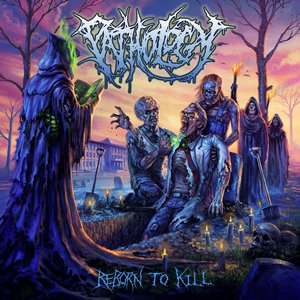Perhaps 2019 is indeed the year of slam, or at least the year slam begins to mature and develop into something more. We’ve seen potent releases from Vulvodynia, Continuum, and Ingested, and have Devourment and Visceral Disgorge in the near future. Doing an unexpected 180 is Pathology, who return with a much altered line-up and what is far and away their strongest release to date.
Much of Pathology’s discography has been riddled with ever-present vocals that were way too high in the mix, and an admittedly low quality mix at that. The songs felt uneven, overly sloppy, and needlessly chaotic because of it. Reborn to Kill remedies those two problems, with a slick production from Zack Ohren and a vocalist swap for Obie Flett, as well as inserting some much needed elements into the band’s core sound. While the well-rounded production, effective without losing the necessary thunderous vibe, does aid the band significantly, the incorporation of 3 new players into Pathology has seemingly brought about some impressive leaps into their repertoire. Not to scare any long-time fans away from the band, as they can still pull off some massive slam/bone-crushing riffs and brutality, but there’s a much greater sense of underlying melody and atmosphere than there has been previously.
“The Druid’s Gavel” has a slow-paced and doomy vibe, ripe with a darkened feel that makes it stand out from the pack. Likewise, the short instrumental “Empathy Ends” is packed with flowing melodies and serves to break up the album nicely. On that same note, “Pit of Bones” is a galloping, near melodeath explosion that works oddly well with the bludgeoning moments of mid-tempo chugs. Blunt force trauma still pervades songs like the frenetic “The Beast Within,” which wildly bounces from speed runs and punishing grooves, but a fiery solo is still inserted to spice it up. There’s a surprisingly diverse feeling to the music, despite its still caustic and aggressive tone. Lastly, Flett’s vocal performance is as visceral and low-end (even divulging into gurgles) as one would like, but also allows the music to breathe a bit so that the rest of the environment gets noticed.
Truly a representative album title, Reborn to Kill sees Pathology at their most deadly and dynamic. Some line-up changes can shake a band, but here they’ve given the act a fresh start – one that’s still just as musically devastating as their previous material but with some added, unexpected layers that bring up their performance to the next level.


